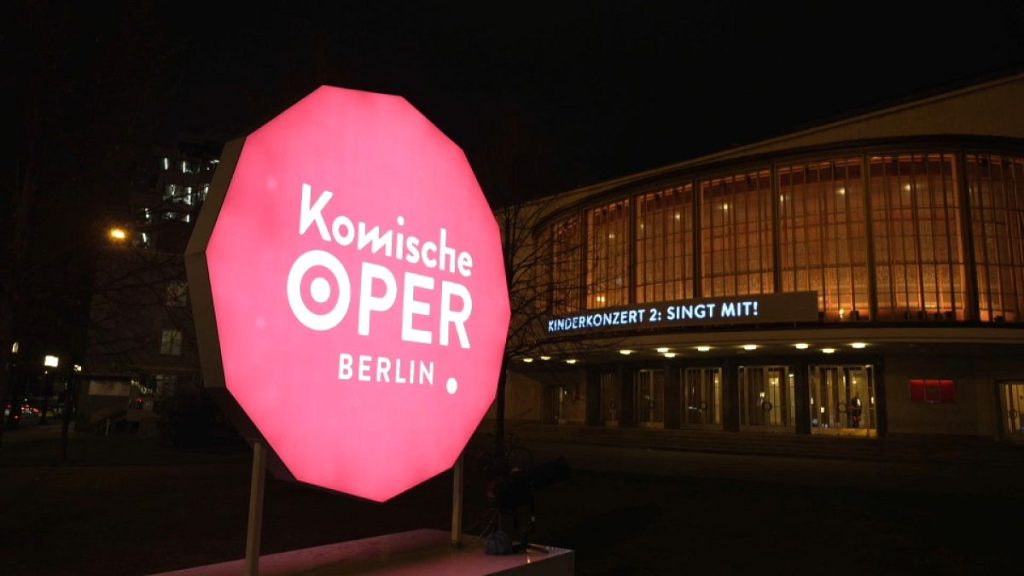The Komische Oper, one of Berlin’s esteemed opera houses, faces a precarious future amidst impending budget cuts to the city’s cultural sector. While narrowly avoiding a complete halt to its ongoing renovations, the opera house, currently operating from a temporary location, must contend with a 10% reduction in its budget, amounting to approximately €4 million. This financial constraint presents a significant challenge, particularly as the opera house grapples with reduced seating capacity and limited storage at its temporary venue, hindering its ability to stage its more ambitious productions. The director, Philip Bröking, emphasizes the disproportionate nature of the cuts, given that the cultural budget represents a small fraction of the city’s overall expenditure. He argues that while savings are necessary, the cultural sector is bearing a heavier burden than warranted.
The renovations, initially deemed essential due to the dilapidated state of the Komische Oper’s original building, are now under threat from the budget cuts. The original building suffered from failing electrical systems, inadequate ventilation, and outdated stage technology, posing safety concerns and hindering artistic expression. While the temporary relocation to the Schiller Theatre provides a stopgap solution, the smaller venue and limited resources present logistical and artistic challenges. Furthermore, delays in the renovation timeline, potentially caused by budget constraints, could lead to significant cost escalations due to inflation in the construction sector. Bröking stresses the importance of completing the renovations expeditiously to ensure the opera house’s long-term financial sustainability.
Berlin’s reputation as a vibrant cultural hub, attracting tourists and fostering artistic innovation, is at stake. The city’s generous arts funding has long been a cornerstone of its identity, distinguishing it from other major metropolises. The proposed budget cuts, however, threaten to undermine this image, potentially jeopardizing the city’s cultural landscape. Bröking highlights the crucial role of cultural institutions in fostering dialogue, exploring complex issues, and reaffirming shared values, particularly in a time of increasing societal polarization. He emphasizes that the arts provide a space for reflection and communication, contributing to a more cohesive and understanding society.
The economic implications of the budget cuts extend beyond the cultural sector. Berlin’s tourism industry, heavily reliant on the city’s cultural attractions, could suffer a significant blow if the quality and accessibility of cultural offerings are diminished. Bröking notes that a substantial portion of Berlin’s tourists engage with the city’s cultural offerings, contributing significantly to the local economy. The potential loss of revenue from tourism, coupled with the negative impact on the cultural sector, raises concerns about the overall economic health of the city. The arts and culture sector, which generates substantial revenue, could be stifled by these cuts, potentially hindering economic growth.
The Komische Oper’s situation mirrors broader challenges facing Berlin’s cultural institutions. The city’s reputation for efficient project management has been tarnished by instances of cost overruns and delays in major infrastructure projects, including the Berlin Brandenburg Airport and the renovation of the Staatsoper. These experiences raise concerns about the city’s ability to manage complex construction projects effectively and within budget. The Komische Oper, striving to avoid a similar fate, emphasizes the importance of completing its renovations on time and within budget to ensure its long-term viability.
Bröking concludes by posing a fundamental question: “What is culture worth to Berlin?” He argues that the city’s rich cultural heritage, a testament to its complex and often turbulent history, is a source of unity and pride. Cultural institutions like the Komische Oper provide spaces for engaging with difficult questions, fostering dialogue, and reaffirming shared values. These institutions play a crucial role in shaping the city’s identity and fostering a sense of community. The proposed budget cuts, therefore, represent not only a financial challenge but also a threat to the very essence of what makes Berlin unique. The Komische Oper’s innovative response, including a multicultural touring bus, showcases its commitment to reaching audiences despite the financial constraints.














